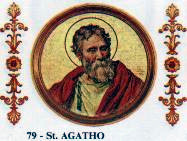Pope Agatho
|
Pope Saint Agatho |
|
|---|---|
 |
|
| Papacy began | 27 June 678 |
| Papacy ended | 10 January 681 |
| Predecessor | Donus |
| Successor | Leo II |
| Personal details | |
| Birth name | Agatho |
| Born |
c. late 6th century Unknown, possibly Province of Sicily, Eastern Roman Empire |
| Died | 10 January 681 Rome, Exarchate of Ravenna, Eastern Roman Empire |
| Sainthood | |
| Feast day |
|
| Venerated in | |
| Attributes | Holding a long cross |
| Patronage | Palermo |
Pope Agatho (died 10 January 681 AD) served as the Pope from 26 June 678 until his death in 681. He is venerated as a saint by both the Roman Catholic and Eastern Orthodox Churches.
Little is known of Agatho before his papacy but he may have been among the many Sicilian clergy in Rome at that time, due to the Islamic Caliphate battles against Sicily in the mid-7th century. He served several years as treasurer of the church of Rome. He succeeded Donus in the pontificate in 679.
Shortly after Agatho became Pope, St Wilfrid, Archbishop of York, arrived in Rome to invoke the authority of the Holy See on his behalf. Wilfrid had been deposed from his see by Theodore, Archbishop of Canterbury, who had carved up Wilfrid's diocese and appointed three bishops to govern the new sees. At a synod which Pope Agatho convoked in the Lateran to investigate the affair, it was decided that Wilfrid's diocese should indeed be divided, but that Wilfrid himself should name the bishops.
The major event of his pontificate was the Sixth Ecumenical Council (680–681), following the end of the Muslim Siege of Constantinople, which suppressed the Monothelite heresy that had been tolerated by previous popes (Honorius among them). The council began when Emperor Constantine IV, wanting to heal the schism that separated the two sides, wrote to Pope Donus suggesting a conference on the matter, but Donus was dead by the time the letter arrived. Agatho was quick to seize the olive branch offered by the Emperor. He ordered councils held throughout the West so that legates could present the universal tradition of the Western Church. Then he sent a large delegation to meet the Easterners at Constantinople.
...
Wikipedia
